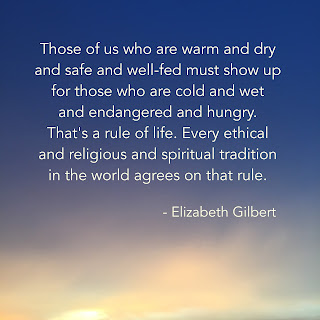I have been asking myself, in these days where the general global rhetoric is one of exclusion, intolerance and hatred, what is really lacking in people? Closer home in Kenya, i see the high cost of injustice, primarily perpetuated by a government that has repeatedly shown it cares little for the citizenry.
Modern-day Kenya is built on a fragile national identity, around an elusive concept of unity, rather kin loyalties, conveniently manipulated by the political class. More lethal is the attitude of most Kenyan politicians; that they are not in office to serve but to be served. They enjoy all the trappings of power and wealth, funded by an overburdened taxpayer, yet they are not sated. They demand for billions more they have not even worked for. This sense of entitlement is compounded by a majority of the population that defends them in a warped logic of religious misinterpretation and only what i can call distorted cognition - continuous exposure to injustice over a long duration - to the extent that it becomes a pervasive national expression. A tragic acceptance of state terror, almost proudly excused, often vocalised in phrases like "At least he left us bones to lick…Elections have to be stolen…He has to appeal to the young electorate". All these lame arguments in tyrannical contexts of impunity, extra-judicial killings, contempt for the rule of law, corruption, failed systems, health care crisis, drought and a host of other internal and external threats. But somehow the enemy is the other Kenyan, not of 'our' tribe.
The only enemy we face is disenfranchisement. There is no justification for the poverty, uncontrolled disease, violence, insecurity and gross mismanagement of national resources, by a largely selfish political class, that ordinary Kenyans endure every day.
Why can't this enemy be seen? Zero ethos.
Few Kenyans have a set of values or benchmark by which they measure and assess the government. It gets worse with ivory tower existence where there is no empathy for those in less privileged situations and no collective determination to stand with the voiceless against injustice. Going by the vitriol spewed on the e-streets of social media and offline spaces, there is less constructive debate substantiated by facts and more ethnic bashing. In the end, the sycophants are the losers too. The plunderers go scot-free, laughing loudest in their frivolous tax-free lives, as Kenyans fail again to hold them accountable.
It is glaringly clear that there is a lack of impartial understanding of what governance and leadership entails. There is a very narrow vision of the fundamental values that bring citizens together to examine a government's performance, beyond the election event which is just the tip of the iceberg. Citizen consciousness has to be a consistent expression that stems from a purposeful and lived conviction which is not swayed by the politics of the day. It is being able to identify, with no confusion, if a government has a clear development agenda and is implementing it in a well-planned manner with prudent fiscal management and a prioritisation of equal national projects, not selectively in ethnic strongholds.
Because most do not stand for the common good, they participate in the persecution of the poor, the sick, the refuge seeker, the unemployed, the minorities… They treat injustice with apathy because it is not their reality. We need not wait to experience indignity in order to say "this is unjust and unacceptable". Some rights are not negotiable. Even if one cannot claim them, they are due simply by being a human being. However, as is painfully obvious in today's world, people are less humane. Inhumanity thrives when people fail to stand up for humanity. Unless we stand for something, we will fall for anything.




